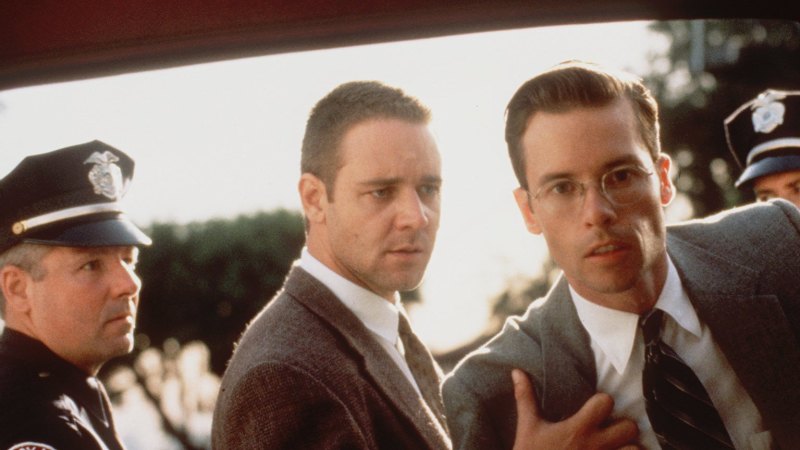Save articles for later
Add articles to your saved list and come back to them any time.
BIOGRAPHY
Love Me Fierce In Danger: The Life of James Ellroy
Steven Powell
Bloomsbury, $32.99
Except perhaps for Jean Genet it’s hard to think of a major 20tth-century writer who got in more trouble with the law as a young man than James Ellroy, who was arrested more than 70 times for theft, public indecency, shoplifting, drunk driving, vagrancy and perhaps most dangerously of all, serial burglary (in the wake of the Manson murders).
One Los Angeles judge was amazed to see young “Lee” Ellroy before him again after all the chances he’d been given. In and out of Los Angeles County jail many times, the judge threatened Ellroy with a much longer stretch in prison unless he got sober and straightened himself out. Sent to work for the Salvation Army, Ellroy took the chance and gradually weaned himself off pills and alcohol and found refuge instead in the LA County Public Library System, where, devouring thousands of books, he decided to become a crime writer.
A still from the film of LA Confidential, featuring Russell Crowe and Guy Pearce. James Ellroy had to cut a quarter of the book before it was published.Credit: AP
Until then, Ellroy’s biography reads like someone who could have become one of California’s many serial killers of the turbulent 1970s and ’80s. Ellroy lived alone with his mother Jean, whom he despised, in an LA suburb, which he hated, until the fatal evening when Jean was murdered, most likely by a mysterious stranger she had met for a date.
James Ellroy’s masterpiece is The Cold Six Thousand.Credit: EPA/ Quique Garcia
Ellroy went to live with his father Armand, a World War 1 veteran who had become a fixer for the movie star Rita Hayworth. As Rita began swinging with a faster crowd, Armand was surplus to requirements and was fired. Bitter, resentful and lumbered with a son to raise by himself, Armand began drinking, gambling, telling elaborate lies and doing anything to avoid work.
Young Lee grew tall and rangy and sullen. Filled with rage he flirted with Nazi ideology, was bullied in school, became a terrifying bully himself and was expelled. Joining and then quickly leaving the army Ellroy effectively became homeless after his father’s death and began his life of petty crime.
Some of this story has been told before in Ellroy’s own memoir, The Hilliker Curse, but Steven Powell’s meticulously researched biography, Love Me Fierce In Danger, fills in many important gaps. Sober and relatively clean, Ellroy got a job as a well-paid golf caddy in Hollywood country clubs and on his downtime began writing three novels, all of which were accepted for publication.
Things started moving quickly. Ellroy quit Los Angeles for a suburb of New York. The famous Nat Sobel became his agent, the even more famous Sonny Mehta of Knopf became his publisher. Ellroy’s LA Quartet were bestsellers, he went on year-long book tours and started winning awards.
His book readings became notorious for their outrageous content. A friend of mine was at one of those readings in Melbourne when Ellroy sang scabrous improvised lyrics to American standards.
Credit:
Powell gives us an encyclopaedic list of Ellroy’s girlfriends and marriages and his tempestuous relationships with colleagues and lovers. In a relatively short book all this can be a bit overwhelming; my favourite part of Love Me Fierce in Danger, however, is Powell’s analysis of and the background to Ellroy’s big middle period novels.
We get confirmation in print about how Ellroy came up with his famous mature prose style. Apparently an editor asked Ellroy to trim a quarter from LA Confidential and, incensed, Ellroy (with Nat Sobel as accomplice) decided to cut all the adverbs, adjectives and many of the verbs too. And just like that the classic and highly influential Ellroy telegraphic literary mode was born.
Ellroy wrote the brilliant Kennedy assassination novel American Tabloid in this style and in 2001, its sequel, his masterpiece, The Cold Six Thousand. When Peter Temple reviewed the latter book in this masthead he called it a “graceless, charmless, witless catalogue of psychopathic behaviour” but I think actually this is the point: America seemed to lose its mind from 1963 to 1973 and all Ellroy did was hold up a mirror.
By this stage Ellroy was rich and famous from his books and the film adaptation of LA Confidential. He appeared on chat shows, packed theatres for performance art book readings, heckled a documentary about his life, publicly rowed with his celebrity fans such as Nick Cave, and bounced Salma Hayek off his knee at a star-studded awards banquet.
The fall, of course, was inevitable and Powell documents the self-destructive period after this when Ellroy began taking drugs again, checked into rehab, checked out of rehab, got divorced, got advice on rehab from Carrie Fisher, fired Nat Sobel and feuded with many of his old friends and colleagues.
The final part of the book takes Ellroy to Denver where he now lives in an apartment building downtown with his ex-wife Helen Knode (who lives in an entirely separate apartment). This is another side of Ellroy, the subdued “Demon Dog”, listening to classical music, writing his books long hand, gazing at the Rocky Mountains over a pot of tea.
This fine semi-authorised biography ends with Ellroy in COVID lockdown planning more novels, making new friends, making new enemies, and perhaps ready to surprise the literary world with more extraordinary books.
Adrian McKinty’s most recent book is The Island (Hachette).
The Booklist is a weekly newsletter for book lovers from books editor Jason Steger. Get it delivered every Friday.
Most Viewed in Culture
From our partners
Source: Read Full Article



